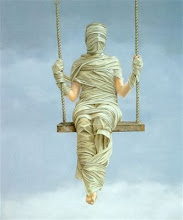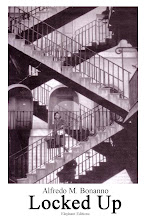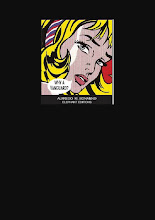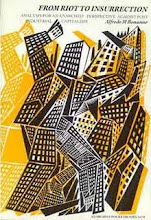Original title: Ma noi siamo moderni? ‘ProvocAzione’ no.20, May 1989, p.7
It is not just a question of words. There is a common line of thought that sees those who want to conserve the past as being quite separate from the supporters of a future that is still to be built. The first are seen as old and stupid, linked to institutions and structures surpassed in time, the second as addicted to transformation and innovation. In between, rooted in the past but with an eye turned to the future, are the so-called reformists and their desires for hazy half measures. It should be said right away that, although we are convinced that this division has seen its day, it still persists in our minds, a mental category we cannot free ourselves from because we do not want to face it. Most of us would never admit that the ‘future’, i.e. modernity, and ‘revolution’ i.e. violent transformation, could do anything but stand together. But is that really so? A progressive idea of history cannot but say it is. But what has historicism led to? Without doubt it has built concentration camps. Also model prisons, but these came later. Millions of people have been slaughtered in the name of the objective spirit that realises itself in History (therefore comes about gradually, in modernity, in the future), and all with the best of intentions. And we are nearly all, anarchists included, children of historicism; at least until proved otherwise. We deduct from this that more or less all of us are for progress (whoever would admit to anything else?) and believe that either we are moving towards a final catastrophe or to a profound, radical change in values. This idea of history as something that is marching to its destiny is reassuring, even when we see this destiny as a complete holocaust This incapacity to question our cultural origins, in the first place historicism, then determinism, scientism, eclecticism (a decent analysis of Malatesta’s thought is necessary here), prevents us from seeing our own condition clearly We nearly all believe we are ‘post’ something or other. Personally I think we are in a post-industrial era and have thought so since at least the end of the Seventies, but this no longer conveys much. Industry such as Ford, Taylor and Marx imagined it has seen its day, and the trades unions and syndicalist organisations, even those we conceived ourselves, have also seen their day. The management of capitalism at world level depends less and less on a concept of life based on the accumulation of value. That is to say that if industry in terms of machinery and skilled labour was the basis of the social transformation that led to the modern world, the end of industry—now replaced by electronically controlled diffused production—marks its eclipse. A new Middle Ages? An absurd question, just as the answers on all sides have been. It is pointless to attempt to see historical ‘remakes’. The political pragmatism of daily adjustments is leading to long term changes in the social whole, where new possibilities of dominion and forms of struggle against oppression are emerging. The acid test of the class struggle is always reality in all its forms, and these forms taken individually, cannot be considered more modern than those that have been supplanted because they no longer correspond to certain aims. This philosophical necessity of choice is purely hypothetical. In reality things are different. Choices from a wide range of variants are possible because the basic values affecting the judgements that produce these choices exist. Considered concretely, i.e. as their effect as elements capable of transforming reality, these values are neither ancient nor modern. The very idea of progress is antithetical to them and produces incredible confusion. For example, is equality an ancient or a modern value? It is impossible to answer this question. Given that it has never existed in reality, at least in recent history, one deduces that it must be related to the future. But is the future modern? We do not know. There are, however, different ways of believing the realisation (or prevention) of equality to be possible. Seen in relation to their effectiveness and their response to social conditions at a given historical moment, these can be considered to be either ancient or modern. And is the accumulation of value ancient or modern for capitalism? Given the conditions at the present time one could say that it is no longer a modern value and that new aims are appearing on the horizons of those in power. Distinction could be one of these values, the distance between two world concepts: those who control the levers of power (the Included) and those who must simply obey and have been programmed and conditioned for this (the excluded). Reductive values such as nihilism, neo-formalism, analphabetism, velocism, supra-nationalism, etc. are also modern values that reconfirm this final separation between included and excluded. But is it possible to consider such values in historicist terms, as being more advanced than those of the past? I really don’t think so. We have often asked ourselves whether it is absolutely necessary to destroy technology or whether we should guarantee its safe revolutionary passage to a possible future ‘good’ use. Then we realised that the technology of computers and universal control could never be useful to a society that starts off from the real liberation of all as opposed to that of a privileged minority. Hence destruction as a necessary fact, a value. Modern? We do not know. There have also been moments of destruction that seemed reactionary in the past (there are still some who speak of the Vendee as something negative, but do so due to their personal historical ignorance) which since have been reexamined more closely. The peasants’ insurrections burned castles. Were they modern? We do not care a bit. Is a struggle today against neo-machinery modern? It is for us because we are trying, not without difficulty, to see things from a point of view that is not totally historicist. Think of the arguments about nuclear power. Ourselves against the bosses who turn out to be—some of them—in favour of it. But on each side of the clash, hallucinations of the Apocalypse. Undoubtedly an effect of historicist culture on both sides. So at a point it is easy for the bosses to reject nuclear energy and transfer their interests and projects elsewhere. The same thing goes for atomic war and the atmosphere of millenarian catastrophe we breathe all around us today. The end of a millennium is fast approaching and the circle will present itself again, always the same and always different The rapid destruction of world resources carried out by the plunderers in power is an inescapable fact. This will either be brought to an end, or it will be transformed when the included of tomorrow build one world suited to their own needs and another for the needs of others. In other words, even the present battle against the wastage of natural resources could become an industry in the future, the foundation of the exploitation of tomorrow. That it is why we propose an immediate systematic attack on all the forms of capitalist expression, both the backward ones still linked to rapid and irrational exploitation and the more advanced ones linked to the electronic control of the planet. In a not too distant future they will shake hands, crushing us in the middle. In order to do this we must have the courage to look backwards as well as forwards. Backwards to seek certain values that are no longer considered ‘modern’. In this research we could single out a few elements that relate to human action: constancy, courage, respect for one’s fellows (human or animal), being harsh with oneself, frugality, a correct consideration of the environment. But others too that are only apparently in contrast: play, love, fantasy, joy, tenderness, dreams. In order to make these things our own, critically, not as dogmas imposed by a globalising concept of the world, we must move towards a radical contrast with the present social situation as a whole. We do not accept compromise. We are not points of reference to be taken for granted. We are not supplying a formula for numerical growth. Now, this position seems to strongly contradict some of the essential points of historicism. Not only does it go against the idea of the Spirit that realises itself in history, it eliminates any privileged point of reference, even, let’s be clear about this, Anarchy. To be against power, the State, class domination and all forms of exploitation is all very well. But to oppose all that with an ideological, dogmatic juxtaposition instead of action, no, absolutely not. If we must reduce anarchy to this in the name of our great ideal, I do not agree. Anyone who enjoys this weekend pastime may do as they please, we will certainly not be the ones to prevent them from walking. But they should not complain if we start running while they are still claiming their rights as free afternoon ramblers. We have never wanted to know anything of these rights. And we contradict historicism, or so it seems, with our craving desire for action. We cannot simply wait for things to come to an end in our absence. We want to be in the game. We want to contribute to transformation in the direction we believe is right, now, not in the sense of a dogma that has been fixed for ever in time. We cannot wait so are acting here and now, recognising no point of reference on which to pin our hopes and expectations. Nor do we recognise the existence of some ‘objective spirit’ or lay god that might be working for our liberation. In the deep of the night where all values tend to be zeroised, if anything lights them up we want it to be the light of our explosions. THE PRIORITY OF PRACTICE When we look at the actions of others we tend to see in them a priority given either to practice or to theoretical reflection. Neither of these satisfies us. When we observe e others we often ask ourselves why they tend one way or the other on the scales of an ideal equilibrium that clearly only exists in our dreams. Is this due to specific interests? Ideological preclusion? Narrow mindedness? Intellectual poverty, or simply stupidity? There is no lack of choice. And usually, often without realising it, we make precisely the judgement that happens to be the most convenient to us, either to take a distance from a practice we do not want to have anything to do with, or so as not to get involved in theoretical positions we do not share. But human beings act within a whole flux of relations where it is not always possible, and never easy, to see clearly where practice ends and theoretical considerations begin. When this impossibility is taken to the extreme limit, theory and practice become one. This is only possible for the sake of argument. Abstract elements are isolated, i.e. taken from a wider context, and the more obvious components emerge. This problem does not only concern theory, it also concerns practice. In other words, by acting in this way we are able to make not only theoretical but also practical ‘abstractions’ We thereby deduce that there is no absolute correlation between ‘abstractness’ and theory at least in the way that those in favour of practice would have us believe. From the moment in which an individual finds himself in a personal and social situation, i.e. from birth and even beyond physical death, they begin working out a theoretical elaboration for all their actions, even the most seemingly blind and conditioned of them. This is constantly present putting, order, within certain limits, into that acting no matter how spontaneous it might appear to be. So theory is part of the experience of life itself the way others bring themselves to our attention in action, joy, feelings, disappointments or in the ideas we allow to penetrate us through reading, studying, looking, talking, listening, but also from transforming, working, destroying. There is not one ‘place’ for theory and another for practice therefore, except in an abstract consideration suspended like a ghost outside the world. The fact that this ghost turns out to be anything but outside this world but acts and produces effects inside it merely confirms what we have just said. In other words there are relations of reciprocal exchange between these two moments of human experience which are themselves part of a general flux, not separate objects in space. We can make a clearer distinction when we speak of how someone who acts tries to set about their action in respect to others. Again it is only possible to identify an ‘orientation’ up to a point, certainly not a constant relationship of cause and effect. This orientation gives us an indication of the actor’s intentions and the condition of who is at the receiving end of the action, all within the vast flux of relations that cannot be isolated in reality, merely singled out for the love of clarity. Whoever acts in any one of a hundred, a thousand, ways makes their intentions known concerning the aim of their action. At the margins these intentions melt into a fluid context, but in their nucleus, during the most significant moments of the event or events that solidify them as intentions, there is considerable orientation indicating the choice of means, clarifying the objective, transforming relations, and all this does not leave reality as a whole unchanged. Here the leaning can be practical or theoretical, according to the actor’s intentions, If on the other hand the prevalence is accidental, comes about by mistake whereas the intention had been quite different, the relation between orientation and objective is reversed. The action takes place with the consequent transformation of individual and collective relations as a whole. But the greater the number of elements of disturbance capable of acting on and reversing the results, the further it will be from the original intention. Criticism, if one really intends to do something and not just give; oneself an ideological cover up, must grasp these discrepancies between intention and objective, aims and action. Criticism that degenerates into simple statements such as those describing the forms taken by the intention/objective relationship is pointless. To say that a given position gives priority to ‘practice’ or that another privileges theory is senseless. It is necessary to see in depth how the action in question can be reached (or at least got a glimpse of) through its orientation And this cannot start from a positive or negative consideration of practice or theory. Worse still, it cannot come from a judgement that gives complete preference to either theory or practice concerning the subject under discussion. All critical analysis should therefore examine the orientation, its adequacy concerning the objective, and this cannot end up with a value judgement. We shall try to be more clear. ‘Inadequate’ interventions take place for various reasons, not all of which are the ‘fault’ of whoever is directing the orientation. From personal incapacity to inadequate decisions (but who establishes how and what qualitative or quantitative-should be done?) the arc is extremely wide. Basically, adequacy should be looked for on the basis of the whole orientation proposed, that is to say it should be ascertained whether there are contradictions within the orientation itself rather than contrasts between proposal and objective. The roads to accomplishing an aim are not always easily grasped, at least not right at the beginning, and it is easy to be led astray by one’s convictions and conditioning. Instead, and this is the point, some research on contradictions is important. Can a reasonable person say then unsay something? Our culture says no, absolutely not. We are the offspring of western rationalism and do not admit contradiction in our orientations. The fact remains that the latter exist, and the results of their unrecognised presence are, unfortunately, always very bitter. Analyses should move in this direction, not cry scandal (when some speak then contradict themselves), but show how and with what consequences the contradictions revealed produce greater or lesser possibilities of reaching the objective chosen. Because that is the way things are, the road of action is not always straight. And the most relevant contradictions, those that make people cry out right away about the inadequacy of the direction when not-and here the cry would definitely be gratuitous—about privileging theory as opposed to practice or vice versa, are precisely those who are unable to make up their minds about the effects of the theory-practice relationship, claiming to separate the inseparable. To conclude this now long precision, let us say that the real problem is not so much that of tracing a uniform way of acting towards an objective as of grasping the orientation in its entirety, seeing the totality of theory and practice as direct action and the transformation of reality as a whole. It is here that the value of what we do lies, not in so-called claims to purity or coherence at all costs, not enclosing everything in a region where the air is so pure one cannot allow any contrast or contradiction, There is no such thing as a dichotomy between those who elaborate theory and those who act, but between those (both in the realms of practice and theory, as their apparent orientation might be, at least according to them) who want to contribute to transforming things from their actual ‘normal’ state to one which is radically different, and those who do not. There are servants of power who feel good in their uniforms and people who want to free themselves, and for this reason have decided to struggle.
skip to main |
skip to sidebar

Some writings of Alfredo Maria Bonanno in English, or almost

Alfredo Bonanno was arrested on October 1st 2009 in Greece, accused of concourse in robbery. With him, anarchist comrade Christos Stratigopoulos.
Here are a few translations and part translations of a small portion of Alfredo's writing. This is a work in progress, many of the translations are as yet incomplete. Open links to find more of Alfredo's work.
Alfredo Bonnano Released
Nov. 22 Alfredo Bonnano was sentenced to 4 years imprisonment (which practically means that with the time served so far and the fact that he is over 70years old HE IS RELEASED
Christos Stratigopoulos (who took responsibility for the action)
was sentenced to 8 years and 9 months with the Greek law will probably be released at the end 2011
BY ANY MEANS NECESSARY
LINKS
click on any of these labels to read text
- "Community" sickness
- 1981 - Editorial
- A Critique of Syndicalist Methods
- A few notes on Sacco and Vanzetti
- A few notes on the revolutionary movement in Italy
- A little man in Singapore
- A million jobs
- A question of class
- Affinity
- After Marx autonomy
- Albania Laboratory of Subversion (Introduction)
- Anarchism and the national liberation struggle
- Anarchists and action
- AND WE WILL ALWAYS BE READY TO STORM THE HEAVENS AGAIN (Against amnesty)
- ANTI-INSTITUTIONAL MOVEMENT
- Are we modern?
- Armed Joy
- ARMED STRUGGLE. SOME REFLECTIONS.
- Autonomous base nuclei
- beyond syndicalism
- Beyond workerism
- But what is the imaginary?
- Class War
- Comiso - Organizational document of the self-managed leagues
- Considerations on illegality
- Dissonances (Introduction)
- Elephant Editions 1986
- Excluded and included
- Farewell to claiming
- Feral Revolution (Introduction)
- FICTITIOUS MOVEMENT AND REAL MOVEMENT
- For an Antiauthoritarian Insurrectionist International - Proposal for a debate
- From riot to insurrection
- From the centre to the periphery
- Good technology
- Guerilla Extraordinary
- Habits and idols
- Hegel
- I know who killed chief superintendent Luigi Calabresi
- Illegality
- Illness and capital
- Informal organisation
- Insurrection
- Internationalism
- Introduction to Sabate
- Introduction to Anarchism and Violence
- Introduction to Bratach Dubh English edition of Malatesta's Fra Contadini
- Introduction to Insurrectionalist Anarchism
- Introduction to Strange Victories
- Introduction to The Conquest of Bread
- Involuntary aspects of voluntary work
- Let's destroy work
- LET'S DESTROY WORK. New introduction
- Let's keep our feet on the ground please
- Lightening Conductors and Stand-ins - more shots of non-news
- Lightning Conductors and Stand-ins
- Lightning Conductors and Stand-ins (cont.)
- Locked up
- Looking forward to self-management
- Loss of language
- More on internationalism
- National Liberation Struggle
- nineteen years on
- No more crises
- Non-news about drugs
- Non-news about racism
- Ode to the Uniform
- On Feminism
- One's life on the line
- Order and chaos
- Otto Ruhle (Introductory Note)
- OUR ROLE IN THE PRESENT CONFLICT
- Palestine mon amour
- Pantagruel anarchist review
- Pinelli
- Prison and Prisoners’ Struggles - Introduction
- Propulsive Utopia
- Quality and the factory
- Restructuring Capital and the new democracy
- Revolution - Violence - Antiauthoritarianism
- REVOLUTIONARY VIOLENCE
- Science and the social revolution
- Self-management
- Severino Di Giovanni in Argentina 1923-1931 by Osvaldo Bayer
- Social banditry
- SOME NOTES -
- Space and Capital
- Stirner
- Stop the City? From information to attack
- Strategy and Methods
- Streamlined production
- The "end" of the crisis
- The aesthetics of anarchism
- The anarchist tension
- The area of autonomy and the anarchist movement in Italy
- The armed wing of science
- The Cruise missile base at Comiso can be prevented
- The ethical bank
- The insurrectional project
- THE LANGUAGE OF TECNICS -
- The logic of insurrection
- The moral split
- THE NECESSARY DESTRUCTION -
- The priority of practice
- The refusal of arms
- The revolutionary project
- The revolutionary struggle
- The significance of an insignificant event
- The struggle for self-managed social space
- The tyranny of weakness
- The whole and the part
- The young in a post industrial society
- Theory and action
- Towards anarchist antimilitarism
- TOWARDS THE GENERALISATION OF ARMED STRUGGLE
- TRANSFORMATION IN THE WORLD OF WORK AND SCHOOL -
- TRUTH -
- Unemployment in Italy - How come everything doesn't explode?
- Untitled
- Violence and non-violence
- What are anarchists
- What can we do with anti-fascism?
- Why a vanguard?
- Why Insurrection
- World domination in a few words











